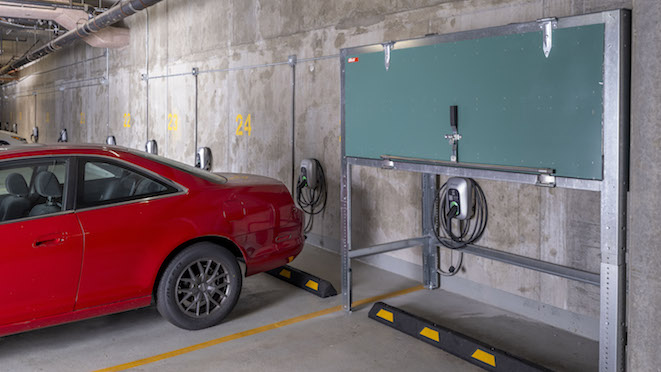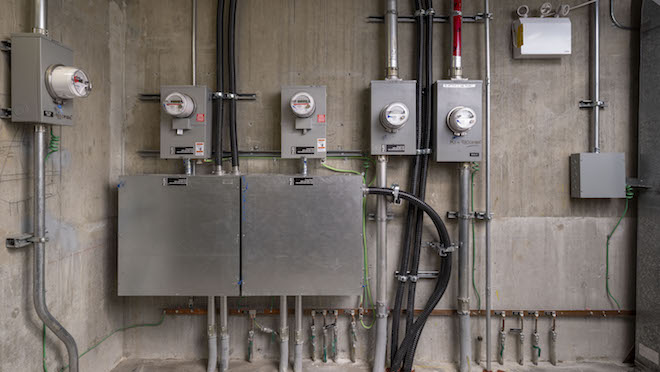 It will likely take years for most residents at Vancouver’s Pacific Place Landmark apartment complex to switch from their gas-powered cars to EVs. But chargers are installed and ready to go.
It will likely take years for most residents at Vancouver’s Pacific Place Landmark apartment complex to switch from their gas-powered cars to EVs. But chargers are installed and ready to go.
Go Electric BC and time-limited NRCan rebates added up to big savings
When residents of a high-rise condo building in Vancouver's Yaletown neighbourhood voted to support a project to install EV charging in every parking stall, they set themselves apart. Most buildings only phase in EV chargers for residents who ask for them. But this building went all in, thank to rebates from Natural Resources Canada (NRCan) rebates and BC Hydro administered Go Electric program.
The bold move required creative problem-solving in the building's electrical room and took careful coordination with city permitting, BC Hydro, the contractor, and the strata's project manager. By fall, the building will have a fully networked Level 2 SWTCH smart charging system ready to support 200-plus EV's, even though only a couple residents currently own one.
Mehmud Karmali lives in the building – Pacific Place Landmark One near the Cambie Street Bridge – and used to be on the strata council. The strata hired him as a project manager. He said that working with an experienced Alliance member (Quinn McLaughlin of MJR Electric) helped make things go smoothly and felt like "talking to your neighbour."
"I'm not an electrician, and had no experience with EV charging. Quinn and his team speak a common language, and take the time to ensure they get the job right."
NRCan's ZEVIP charging rebates deadline for multi-family buildings was September 19, 2024. Karmali worked with MJR Electric and BC Hydro to ensure the project qualified for the rebate. To get the best value from the rebate, the forward-looking council backed the decision to install chargers in all parking spots rather than phasing it in.
The project took advantage of BC Hydro administered Go Electric BC program, offering rebates of up to $3,000 for an EV Ready plan, up to $120,000 for EV Ready infrastructure, and up to $14,000 for chargers. While the federal ZEVIP rebate program (currenlty closed) covered 50% of project costs, up to $5 million, the overall, $1.15 million-EV charging project – including EV Ready plan and infrastructure work – left owners to cover a combined $623,000 after rebates. A third of that came from the strata’s contingency fund, leaving a cost of about $2,200 per owner, thanks to substantial rebates.
Bringing EV charging to multi-unit residential buildings is just one way BC Hydro is driving sustainable growth in B.C. We're also investing in renewable energy, supporting local innovation, and forging new partnerships that strengthen the economy and create jobs. For MJR, early involvement in EV charging has fueled growth too, expanding their team three employees to 10.
 A bit of good fortune led to a creative solution in MJR Electric’s retrofit of the existing electrical room at Pacific Place Landmark, saving time and costs.
A bit of good fortune led to a creative solution in MJR Electric’s retrofit of the existing electrical room at Pacific Place Landmark, saving time and costs.
Electrical room solution saves time and money
Working with the Alliance of Energy Professionals, MJR Electric got into EV charging infrastructure early, starting with single-family homes and then into full parkade retrofits. They've now completed more than 30 EV charging projects and used that experience to find a cost-saving solution at Pacific Place Landmark One.
"We had to retrofit an existing electrical room, which meant using older 400-amp CT enclosures and 200-amp meter sockets," says McLaughlin. "We worked with BC Hydro to confirm which meters weren't in use. Once approved, we reused those CT cabinets instead of replacing the entire switchgear." The special usage was approved after verifying the older meters weren't active. McLaughlin admits that the strata was lucky, reusing the CT cabinet saved a lot of money.
Power will be delivered over circuits servicing between four to six stalls, which should only require slowing of the charging system once the residents' EV adoption hits 100 or more EVs in the parkade.
"For the first five years, there's likely only about 30 to 50 EVs in there, and that won't make a big difference in load," says McLaughlin. "There may be situations where we've set up a six-stall circuit, one person gets an EV and others on that circuit decide to do it too. Only then might there be the need for some slower charging on a circuit."
Insights from MJR's work in Vancouver
McLaughlin says that while infrastructure approvals from BC Hydro can take time, the process was straightforward. Some electrical room upgrades were needed, like adding a new CT meter base and isolated neutrals.
According to McLaughlin, the City of Vancouver is getting increasingly rigorous with its permitting requirements. "You really need to have your ducks in a row to ensure you have the paperwork, engineer stamps, and 12-month history from BC Hydro showing you have space on the service," he says. "The City's higher standards are a good thing since they're doing thorough research before approving projects."
On his wish list is a quick-tips form from BC Hydro, detailing rebates, and inspection requirements. While contractors are responsible for meeting all code and program requirements, BC Hydro is working on resources to help.
"I'd like to see some standardization or a best practices document," says McLaughlin.
His message to fellow Alliance members is to communicate early with BC Hydro to avoid delays, be creative with problem solving, and be up-front with the customer about costs.
"It pays to do your homework when quoting on these projects," he says. "Make sure you're not surprising your client with an extra $200,000 or $150,000 for a service re-entry after the initial site visit."
The benefits of a having a project manager hired by the strata
Pacific Place Landmark One strata was busy and didn't have the capacity to manage the EV charging project, so they hired Karmali, former strata council treasurer, as project manager. He handled everything from financing and securing owner support, rebate compliance, liaising with MJR Electric, creating a user electricity pricing model, investigating potential fuel carbon credits, and drafting strata bylaws.
McLaughlin appreciated the help. While MJR Electric used to manage the rebate applications, we prefer stratas handle them, partly due to confidential payment information.
Karmali credits MJR Electric with educating the strata on the project, making it easier to sell the idea to the owners, who gave "overwhelming, nearly unanimous" votes for funding. Even though only a small percentage of owners currently own EVs, owners were convinced of the longer-term gains, including estimated monthly fuel savings of $200 to $450, and better marketability of their condos.
"Introducing new technology in a building like this, which is about 30 years old, a lot of owners can be skeptical," says Karmali. "It was important to tell the story to owners in a way that they could appreciate, that wasn't overly technical.
"Only 10% to 15% of the residents will use the chargers in the first year. Most won't see an immediate benefit, but once they understood why it's needed, it was full steam ahead."